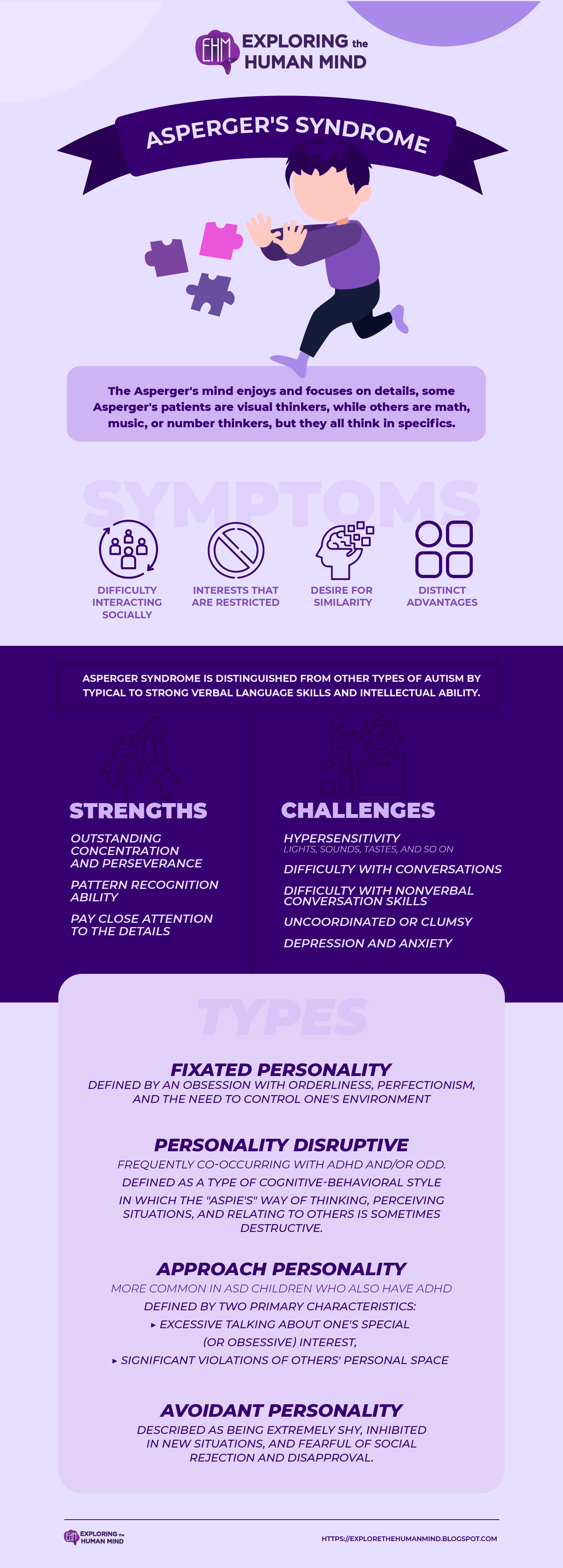Asperger's syndrome
Asperger syndrome is distinguished from other types of autism by typical to strong verbal language skills and intellectual ability.
Young people with Asperger's Syndrome have difficulty socially connecting with others, and their behavior and thought patterns can be rigid and repetitive.
In general, children and teenagers with Asperger's Syndrome can communicate with others and perform well in school. They do, however, struggle to understand social situations and subtle forms of communication such as body language, humour, and sarcasm. They may also think and talk a lot about one topic or interest, or they may only want to do a limited number of activities. These interests can become obsessive and interfere with daily life, rather than providing a healthy social or recreational outlet for the child.
Asperger's Syndrome affects boys three to four times more than girls. The majority of cases are discovered between the ages of five and nine, with some discovered as young as three. Asperger syndrome, also known as Asperger's syndrome, is a previously used autism spectrum disorder diagnosis. It was included in the Diagnostic and Statistical Manual of Mental Disorders 5 (DSM-5) in 2013 as part of a single umbrella diagnosis of autism spectrum disorder (ASD).
Asperger syndrome generally involves:
- Difficulty interacting socially
- Interests that are restricted
- Desire for similarity
- Distinct advantages
Strengths can include:
- Outstanding concentration and perseverance
- Pattern recognition ability
- Pay close attention to the details
Challenges can include:
- Hypersensitivity (to lights, sounds, tastes, and so on)
- Difficulty with conversational give and take
- Difficulty with nonverbal conversation skills (distance, loudness, tone, etc.)
- Uncoordinated or clumsy movements
- Depression and anxiety
The previously mentioned tendencies vary greatly between people. Many people learn to overcome obstacles by focusing on their strengths.

vectors by Freepick; graphic design by Vadot
Asperger's personality types
Fixated Personality
The fixated personality type is defined by an obsession with orderliness, perfectionism, and the need to control one's environment (e.g., having things in a specific order).
Personality Disruptive
The disruptive personality is defined as a type of cognitive-behavioral style in which the "Aspie's" way of thinking, perceiving situations, and relating to others is sometimes destructive, and is frequently co-occurring with ADHD and/or ODD.
Approach Personality
This type is more common in ASD children who also have ADHD, but it is not always the case.
The "approach personality" is defined by two primary characteristics:
(a) excessive talking about one's special (or obsessive) interest, and
(b) significant violations of others' personal space.
Avoidant Personality
A pattern of social inhibition, feelings of inadequacy, and hypersensitivity to negative evaluation characterizes the avoidant personality. This type of autistic child is frequently described as being extremely shy, inhibited in new situations, and fearful of social rejection and disapproval. An Aspie's avoidant personality becomes a major component of his overall character and a central theme in how he interacts with others.
Reference:
Asperger’s Syndrome: Symptoms, Diagnosis and Treatment. (2023). Nationwidechildrens.org. https://www.nationwidechildrens.org/conditions/aspergers-syndrome#:~:text=Asperger%27s%20Syndrome%2C%20a%20form%20of,can%20be%20rigid%20and%20repetitive.
Penttila, N. (2002, October). The World Needs People With Asperger’s Syndrome. Dana Foundation; Dana Foundation. https://www.dana.org/article/the-world-needs-people-with-aspergers-syndrome/#:~:text=The%20Asperger%27s%20mind%20enjoys%20and,but%20all%20think%20in%20speci%EF%AC%81cs.
What Is Asperger Syndrome? | Autism Speaks. (2013). Autism Speaks. https://www.autismspeaks.org/types-autism-what-asperger-syndrome






Comments
Post a Comment